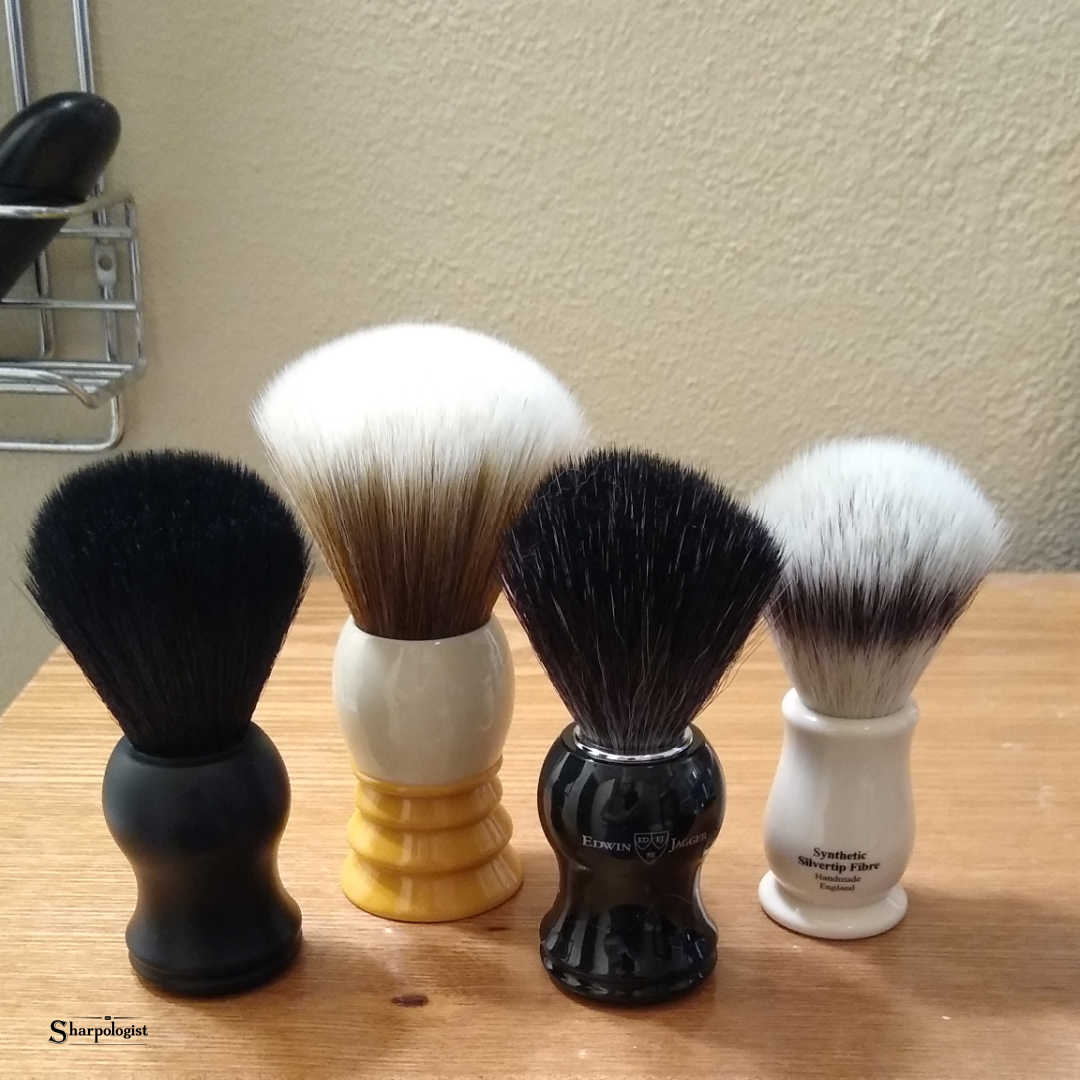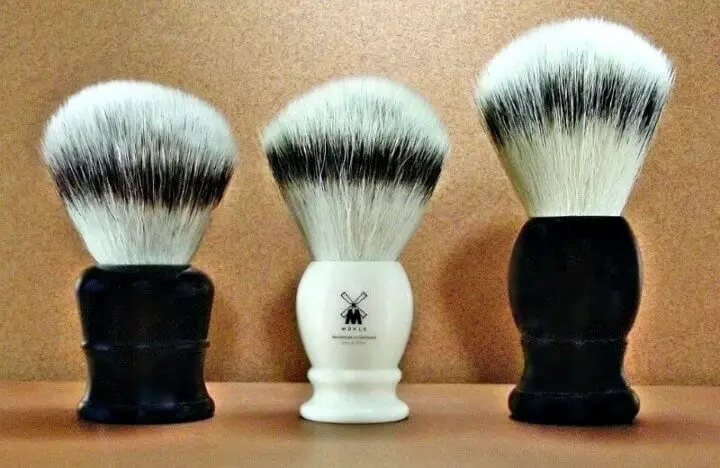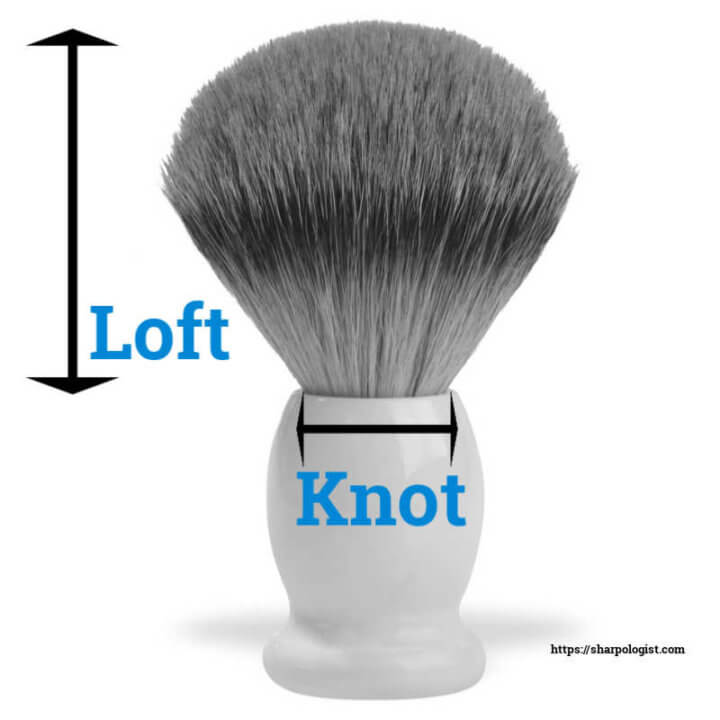
The art of traditional shaving requires the right tools, and a shaving brush is one of them. One of the most debated topics in this area is whether to opt for a premium synthetic or a badger hair brush. While some traditionalists vouch for badger hair brushes, modern advancements have made synthetic brushes an attractive option as well.
Understanding Shaving Brushes
Shaving brushes play a crucial role in traditional wet shaving, providing several benefits for a satisfying shaving experience. These brushes exfoliate the skin and effectively lift facial hair, preparing it for a closer shave. By evenly distributing shaving cream or soap, they ensure better coverage, allowing the razor to glide smoothly over the skin in a circular motion. The bristles of the shave brush retain moisture, keeping the skin hydrated during the shave.
Is Synthetic or Badger Better? Fight!
Synthetic brushes are affordable and improving in quality, while badger brushes offer softness and the ability to create a luxurious lather. Ultimately, the choice depends on your needs and shaving style.
When it comes to the synthetic vs badger brushes debate, many traditional shavers recommend trying both options to determine which one works best for your shaving needs. Some prefer synthetic brushes due to their durability and quick drying time. On the other hand, there are those who argue that badger brushes provide a more traditional and luxurious shaving experience. Factors such as budget, personal preference, and skin sensitivity should also be taken into consideration when choosing a brush.
Badger Hair Brushes: An Overview
Badger hair brushes, especially the silvertip style of fiber, are renowned for their softness, and water and heat retention, making them highly sought after in the world of wet shaving. The different grades of badger hair–such as silvertip, best badger, and pure badger–offer varying degrees of quality and performance. These brushes excel in creating a good lather and providing gentle exfoliation, enhancing the overall shaving experience.
Wet shaving enthusiasts often prefer the traditional feel and luxuriousness of badger hair brushes, especially the silvertip style. However, it’s important to note that these brushes require proper care to maintain their longevity and quality.
And there are ethical concerns around using badger hair brushes due to animal welfare issues. The processing of badgers from China in particular (widely regarded as a pest and trapped under license there)–by far the primary source of badger hair for shave brushes–have come under criticism for years as unnecessarily cruel.
An Overview Of Synthetic Fiber Shave Brushes

Synthetic brushes, made from artificial materials, are cruelty-free and do not involve the use of animal hair, making them an ethical choice. They are designed to mimic the properties of natural bristle brushes. In terms of performance and durability the latest generations of synthetic brushes excel, delivering excellent results for wet shaving enthusiasts. Synthetic brushes are also hypoallergenic, perfect for individuals with allergies.
Additionally, their affordability makes them an attractive option compared to badger hair brushes.
Synthetic brushes offer several other advantages over their badger hair counterparts. One significant advantage is their quick drying time, which makes them ideal for travel or individuals with limited time. Additionally, synthetic brushes are easy to clean and require less maintenance compared to badger hair brushes.
While possibly not holding quite as much water as badgers, they’re just as soft & dry quicker, making synthetics a great choice for travel. Many prefer using a non-natural derived bristle, as no animal is used or harmed in its production.
However, it’s worth noting that synthetic brushes may lack the tactile feel found in high-grade badger hair brushes, which some wet shaving enthusiasts prefer for a more traditional experience.
How to Choose the Right Shaving Brush?
When selecting a shaving brush, consider your skin type and sensitivity. Determine your preferred lather texture and take into account your budget and maintenance requirements. Research different types of brushes like badger hair, synthetic, horse, or boar bristle. Seek recommendations to find the best one for your needs.
Factors to Consider While Selecting a Shaving Brush

When selecting a shaving brush, there are several factors to consider that can greatly impact your shaving experience. Knot size and loft are important to determine the performance and lather capacity of the brush, with larger knots providing more coverage.
The handle material and design should offer a comfortable grip during the shave, ensuring better control and maneuverability.
Aesthetics also play a role, as the brush can be a reflection of personal style.
Additionally, consider your preference for bristle softness or stiffness, as this can greatly affect the feel on your face. Finally, choosing a reputable brand ensures quality craftsmanship, longevity, and a suitable backbone for the brush.
Do Synthetic Shave Brushes Have a Longer Lifespan Than Badger Brushes?
Synthetic brushes tend to have a longer lifespan than badger brushes. They are durable, with bristles that are less likely to shed and can withstand regular use. Badger brushes may require more maintenance and can wear out over time. However, with proper care, both types can last for a significant amount of time.
Conclusion
Both badger hair shaving brushes and synthetic shave brushes have their own unique advantages and disadvantages. It ultimately comes down to personal preference and individual needs. Badger hair brushes are known for their luxurious feel and ability to retain water, making them great for creating a rich lather. On the other hand, synthetic brushes are cruelty-free, hypoallergenic, and often more affordable. They also dry faster and require less maintenance.

I have one badger, 2 Boar, 2 horse hair and 4 synthetics. Still looking for the Yeti fur brush
I really like the modern synthetics. I can remember the old, stiff synthetics that flung lather all over the mirror. However, I still prefer badger over any brush fiber.
I get that some may be concerned about animal cruelty. The flip side, though, is that natural hairs will break down over time once the brush is worn out; will synthetics? From an environmental perspective, animal hair may be the better option.
I have a dozen or so brushes – a few synthetic; a few badger; a few boar; and a couple of horsehair. For environmental reasons, I’ve been leaning natural – the last few, I’ve even ensured the handles were wood rather than plastic.
Horsehair is the best natural choice if you’re worried about animal cruelty, as the hairs are gathered from grooming the mane and tail. But they can be rather floppy and tangly. My mighty mite, the Semogue Pharos, has decent backbone and doesn’t tangle, and whips up a nice lather. The handle is wooden too. It is a bit skritchy, though – something I like, but not everyone would. Given its small size and low price, versus its performance, I consider it one of the best bargains out there for brushes. But then, I don’t need fancy or expensive; just something that works.